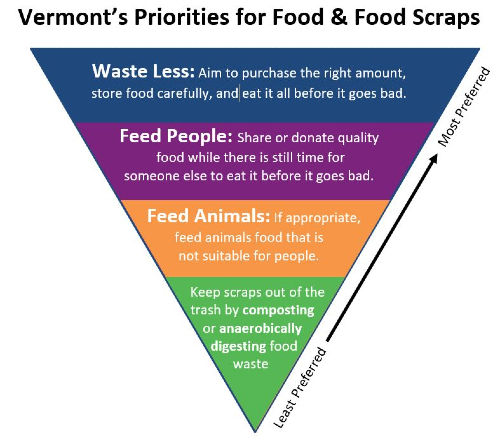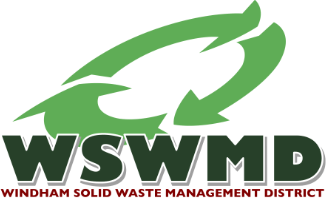Feed People Not Landfills
Vermont’s Universal Recycling law adopted a Food Recovery Hierarchy into law in 2012. Vermont is the first state in the nation to legislatively adopt priority management for food before it is discarded.

Why Donate Edible Food?
Under the Universal Recycling law, businesses and institutions are required to divert discarded food from the landfill beginning in 2014 if within 20 miles of a certified facility that can process it. With a significant amount of that discarded food being edible, businesses and institutions can save money on collection costs and be eligible for tax benefits by donating the edible food to charities and diverting the rest through composting or anaerobic digestion. Donating food to charities has federal liability protection.
According to valid research, there has NEVER been a lawsuit involving food donations.
The following links help to clear up the legality of food donations.
- The Bill Emerson Good Samaritan Food Donation Act provides protection from liability for the donation of food that is ‘apparently wholesome’ without visible quality issues
- This post from the USDA provides information about the Good Samaritan Act
- The Harvard Food Law and Policy Clinic prepared a fact sheet regarding federal liability protection and tax incentives for food donation
- Donation Guidance for Businesses and Institutions
- Vermont’s DEC resources for Donating Food
When donating food, it is important to remember that the donation is for human consumption and needs to be handled accordingly. If food looks or smells bad, is moldy, or has damaged packaging do not donate it – compost it! All donated food should be protected to prevent food contamination by storing in packages, covered containers, or wrappings.
Donation Guidance for Businesses and Institutions (Click here to view pdf)
Refer to this guidance document when evaluating the opportunity to initiate donation of edible food to a food rescue organization. The Agency of Natural Resources has partnered with the Vermont Department of Health and the Agency of Education to develop guidance for implementing or expanding a food donation program at a Vermont business or intuition.
Click here for a list of available food pantries in WSWMD’s district towns.
